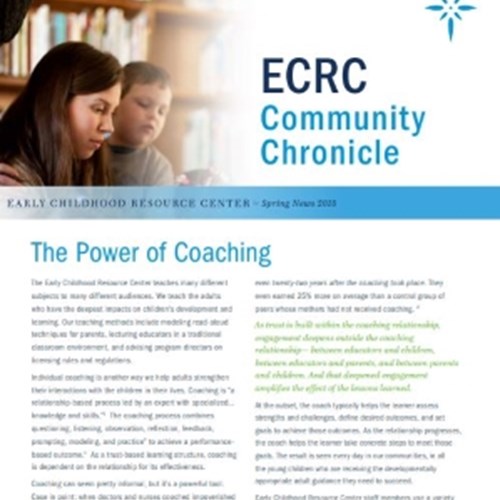Early Childhood Resource Center focuses on the power of coaching

Coaching is a powerful way to teach educators and parents alike, which is why the Early Childhood Resources Center focuses on a number of coaching techniques. The latest issue of the ECRC Community Chronicle newsletter highlights the many ways the center uses coaching to teach parents and educators, including why hands-on guidance matters, how the center ensures that all kinds of learners have access to meaningful professional development and how the center is helping child care providers forge meaningful relationships with the families of the children they serve.
The full text of the newsletter’s front page article appears below.
The Power of Coaching
The Early Childhood Resource Center teaches many different subjects to many different audiences. We teach the adults who have the deepest impacts on children’s development and learning. Our teaching methods include modeling read-aloud techniques for parents, lecturing educators in a traditional classroom environment, and advising program directors on licensing rules and regulations.
Individual coaching is another way we help adults strengthen their interactions with the children in their lives. Coaching is “a relationship-based process led by an expert with specialized…knowledge and skills.” The coaching process combines questioning, listening, observation, reflection, feedback, prompting, modeling, and practice” to achieve a performance-based outcome. As a trust-based learning structure, coaching is dependent on the relationship for its effectiveness.
Coaching can seem pretty informal, but it’s a powerful tool. Case in point: when doctors and nurses coached impoverished Jamaican mothers weekly on ways to increase stimulation and play with their babies and young children, the children had higher reading, math, and general knowledge scores, stayed in school longer, were less violent, and had better social skills, even twenty-two years after the coaching took place. They even earned 25% more on average than a control group of peers whose mothers had not received coaching.
As trust is built within the coaching relationship, engagement deepens outside the coaching relationship— between educators and children, between educators and parents, and between parents and children. And that deepened engagement amplifies the effect of the lessons learned.
At the outset, the coach typically helps the learner assess strengths and challenges, define desired outcomes, and set goals to achieve those outcomes. As the relationship progresses, the coach helps the learner take concrete steps to meet those goals. The result is seen every day in our communities, in all the young children who are receiving the developmentally appropriate adult guidance they need to succeed.
Early Childhood Resource Center staff members use a variety of coaching techniques to help adult learners achieve their goals. We discuss some of those techniques in this newsletter, in order to highlight some of the services we provide throughout our region.
The Early Childhood Resource Center is a ministry of the Sisters of Charity Health System.
- Sisters of Charity Health System
- News Releases
- St. Vincent Charity Health Campus
- Light of Hearts Villa
- Regina Health Center
- Sisters of Charity Foundation of Canton
- Sisters of Charity Foundation of Cleveland
- Sisters of Charity Foundation of South Carolina
- Building Healthy Communities
- Catholic Community Connection
- Early Childhood Resource Center
- Healthy Learners
- Joseph and Mary's Home
- South Carolina Center for Fathers and Families
